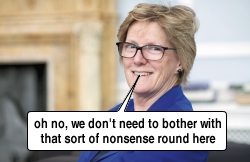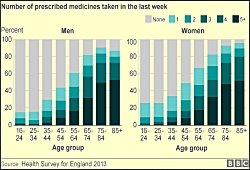 After the season of good will, the season of bad omen. More Blu-Tack than tack sharp, Dame Sally Davies, the Chief Medical Officer, stuck at the end of last week to her message that there was no such thing as a safe limit to alcohol consumption, but if you wanted to live dangerously, then she supposed up to 14 units a week was tops. On the Today programme, she was the worthy teacher cajoling the dull child, only to be out-smarted by J Webb, who popped the public health message balloon by pointing out that normal drivers face a similar lifetime risk of death as that implied by the new alcohol limit, yet the Government has yet to advise us that there is no safe level of driving, or that drivers should limit themselves to 14 miles a week. The balloon popped so far above Dame Sally’s head that she missed it. When Jay repeated the point, the response was of the ‘oh no, we don’t need to bother with that sort of nonsense round here’ kind, followed by more chugging rhetoric on the risk of dying from breast cancer.
After the season of good will, the season of bad omen. More Blu-Tack than tack sharp, Dame Sally Davies, the Chief Medical Officer, stuck at the end of last week to her message that there was no such thing as a safe limit to alcohol consumption, but if you wanted to live dangerously, then she supposed up to 14 units a week was tops. On the Today programme, she was the worthy teacher cajoling the dull child, only to be out-smarted by J Webb, who popped the public health message balloon by pointing out that normal drivers face a similar lifetime risk of death as that implied by the new alcohol limit, yet the Government has yet to advise us that there is no safe level of driving, or that drivers should limit themselves to 14 miles a week. The balloon popped so far above Dame Sally’s head that she missed it. When Jay repeated the point, the response was of the ‘oh no, we don’t need to bother with that sort of nonsense round here’ kind, followed by more chugging rhetoric on the risk of dying from breast cancer.
Category: Coercive Healthism
Bitter Pill for Sugar Tax
 Britain and sugar go back a long way, and the history is not that glorious. Sugar, or white gold as it was known, was the reason for the infamous trade triangle, the round trip that took slaves from Africa to the American colonies, sugar from the colonial plantations to Britain, and goods from Britain back to Africa to buy more slaves. By the mid 18th Century, the trade was so lucrative that the then British Government, blissfully unaware of yet to come concepts of coercive healthism and the nanny state, did the fiscal thing, and slapped a tax on sugar, making it a luxury item. The situation was turned on its head in the mid 19th Century, when the Free Breakfast Table movement, an early Liberal free school meals idea aimed instead at the working classes as a whole, brought about the abolition of duties on sugar and other breakfast table commodities, and the masses were freed to shovel ever larger quantities of sugar down the cake hole. Every Little Helps, as they say at Tesco. Even today, The Great British Bake Off, when it isn’t about the BBC showing off its ethnic credentials, is all about devising yet more elaborate ways of getting yet more sugar through the cake hole.
Britain and sugar go back a long way, and the history is not that glorious. Sugar, or white gold as it was known, was the reason for the infamous trade triangle, the round trip that took slaves from Africa to the American colonies, sugar from the colonial plantations to Britain, and goods from Britain back to Africa to buy more slaves. By the mid 18th Century, the trade was so lucrative that the then British Government, blissfully unaware of yet to come concepts of coercive healthism and the nanny state, did the fiscal thing, and slapped a tax on sugar, making it a luxury item. The situation was turned on its head in the mid 19th Century, when the Free Breakfast Table movement, an early Liberal free school meals idea aimed instead at the working classes as a whole, brought about the abolition of duties on sugar and other breakfast table commodities, and the masses were freed to shovel ever larger quantities of sugar down the cake hole. Every Little Helps, as they say at Tesco. Even today, The Great British Bake Off, when it isn’t about the BBC showing off its ethnic credentials, is all about devising yet more elaborate ways of getting yet more sugar through the cake hole.
Not Entirely Appropriate
 Supposed once by David ‘Hug a Hoodie’ Cameron to be the embodiment of big society in a way that say dear Joanna Lumley never could be, Camila Batmanthingy exploded last week as her charity Kids Company imploded. Boy, was it a big explosion, as if Demis Roussos, once described by Clive James as another larger than life Phenomenon having an immense reserve of inner warmth, had exploded. Appearing with a succession of ever more luminous ever larger tablecloths wound round her head and wrapped round her body, she railed and ranted against the media rumour-mongers who, she said, had caused Kids Company to come crashing down, in the space, she would have us believe, of a few days, if not hours. Other accounts have it that, like Icarus before her, Camila flew too high, and the steady heat of scrutiny melted the wax of her charity. The collapse was as complete as it was sudden.
Supposed once by David ‘Hug a Hoodie’ Cameron to be the embodiment of big society in a way that say dear Joanna Lumley never could be, Camila Batmanthingy exploded last week as her charity Kids Company imploded. Boy, was it a big explosion, as if Demis Roussos, once described by Clive James as another larger than life Phenomenon having an immense reserve of inner warmth, had exploded. Appearing with a succession of ever more luminous ever larger tablecloths wound round her head and wrapped round her body, she railed and ranted against the media rumour-mongers who, she said, had caused Kids Company to come crashing down, in the space, she would have us believe, of a few days, if not hours. Other accounts have it that, like Icarus before her, Camila flew too high, and the steady heat of scrutiny melted the wax of her charity. The collapse was as complete as it was sudden.
Shoots You, Sir
 If patriotism is the last refuge of a scoundrel, then news about news is the last refuge of a desperate editor. In an editorial in the BMJ this week, Ben Goldacre and Carl Heneghan report on ‘extensive news coverage’ of a ‘leaked letter’ from the Chief Medical Officer to the Academy of Medical Sciences asking for an enquiry into how society should judge the safety and efficacy of drugs. This is hardly the stuff of which crackling headlines are made. Dr No missed it, and so too did most of the media. According to google news, only the BBC and The Guardian covered the story in the national media, with remaining coverage confined to such erstwhile journals as the PharmaTimes of Freakistan. The leak, it turns out, was about as newsworthy as a damp patch on an incontinent’s mattress.
If patriotism is the last refuge of a scoundrel, then news about news is the last refuge of a desperate editor. In an editorial in the BMJ this week, Ben Goldacre and Carl Heneghan report on ‘extensive news coverage’ of a ‘leaked letter’ from the Chief Medical Officer to the Academy of Medical Sciences asking for an enquiry into how society should judge the safety and efficacy of drugs. This is hardly the stuff of which crackling headlines are made. Dr No missed it, and so too did most of the media. According to google news, only the BBC and The Guardian covered the story in the national media, with remaining coverage confined to such erstwhile journals as the PharmaTimes of Freakistan. The leak, it turns out, was about as newsworthy as a damp patch on an incontinent’s mattress.
No Easy Answers
 There’s not much to say, even if Dr No is going to say a bit, about Atul Gawande’s third 2014 Reith Lecture, except that he blew it in the title – overweening confidence, Gawande’s definition of hubris, is not the problem, striving officiously in hopeless desperation is – and then spent thirty or so minutes stating the bleeding obvious. Called The Problem of Hubris, the lecture dealt with doctors’ failure to deal with the inevitable, the appointment we all must keep when our bell tolls, the appointment not with a doctor, but with death.
There’s not much to say, even if Dr No is going to say a bit, about Atul Gawande’s third 2014 Reith Lecture, except that he blew it in the title – overweening confidence, Gawande’s definition of hubris, is not the problem, striving officiously in hopeless desperation is – and then spent thirty or so minutes stating the bleeding obvious. Called The Problem of Hubris, the lecture dealt with doctors’ failure to deal with the inevitable, the appointment we all must keep when our bell tolls, the appointment not with a doctor, but with death.
Time for a Gawande anecdote, this time about a friend called Peg. Emotional strings were taughtened by casting Peg as piano teacher to Gawande’s 13 year old daughter. Given Gawande’s subject, one knew Peg’s cards were marked: at some point, Peg would peg out. Best be grateful for small mercies: at least Peg wasn’t called Sue.
Discipline Makes Daring Possible
 When the Chief Medical Officer feels uncomfortable, should the nation tremble? Probably not. Certainly, Dr Atul Gawande didn’t, fielding Dame Sally Davies’s troubled comments after giving his second 2014 Reith Lecture, broadcast this morning on Radio Four. Speaking in his now familiar, you know, George W Bush style “Our people done a really good job…of, you know…hauling in a lot of the key operators”, Gawande extolled the virtues of getting systems right. Goaded by air industry experts baffled at the casual approach of surgeons to their work, Gawande developed The CheckList. Depending on viewpoint, the CheckList is either strictly for the dumb-assed, or a sort of systems alchemy that transforms the inept into the ept, and experts into super-experts. Doubters are stumped and declared out for a duck by asking them a simple question: “If you’re having an operation, would you want the team to use the checklist?” Unsurprisingly, ninety four percent did, though that leaves the intriguing question what did the other six percent want? Dr Frankenstein? A one armed blind surgeon with a prosthetic hand and Parkinson’s disease? We’ll probably never know, because by now they will have maimed or killed themselves some other way.
When the Chief Medical Officer feels uncomfortable, should the nation tremble? Probably not. Certainly, Dr Atul Gawande didn’t, fielding Dame Sally Davies’s troubled comments after giving his second 2014 Reith Lecture, broadcast this morning on Radio Four. Speaking in his now familiar, you know, George W Bush style “Our people done a really good job…of, you know…hauling in a lot of the key operators”, Gawande extolled the virtues of getting systems right. Goaded by air industry experts baffled at the casual approach of surgeons to their work, Gawande developed The CheckList. Depending on viewpoint, the CheckList is either strictly for the dumb-assed, or a sort of systems alchemy that transforms the inept into the ept, and experts into super-experts. Doubters are stumped and declared out for a duck by asking them a simple question: “If you’re having an operation, would you want the team to use the checklist?” Unsurprisingly, ninety four percent did, though that leaves the intriguing question what did the other six percent want? Dr Frankenstein? A one armed blind surgeon with a prosthetic hand and Parkinson’s disease? We’ll probably never know, because by now they will have maimed or killed themselves some other way.
Making Illness Fun
 For a man with a name that sounds like a vintage Italian motorcycle, Peretti runs pretty smooth. The creator of The Men Who… documentaries – The Men Who Made Us Fat (about the food industry), The Men Who Made Us Thin (about the weight loss industry) and the surely inevitable but yet to come The Men Who Made Us Fart (about fashionable diets) – recently presented his latest mini-series, The Men Who Made Us Spend, about marketing. Tooling around the globe in vest and V-neck (how about The Men Who Made Us Shirtless, about bankers?), Peretti kicked off by exposing the hidden suicide pact engineered into products to ensure they go pop before their time, and we buy a new one. First up was Osram, who a hundred years ago put the blow back into bulbs, thus ensuring that when the lights went out for the consumer, the profits went up for the manufacturer. More recently, we have the doomsday counters hidden in printer consumables that announce game over even when there is still plenty ink in the cartridge. A picture emerged of a world where cynical industries push kamikaze products on gullible punters to keep the manufacturers in profit. Had Oscar Wilde been in the manufacturing line, he would have known what to say. Either the product goes, or I go.
For a man with a name that sounds like a vintage Italian motorcycle, Peretti runs pretty smooth. The creator of The Men Who… documentaries – The Men Who Made Us Fat (about the food industry), The Men Who Made Us Thin (about the weight loss industry) and the surely inevitable but yet to come The Men Who Made Us Fart (about fashionable diets) – recently presented his latest mini-series, The Men Who Made Us Spend, about marketing. Tooling around the globe in vest and V-neck (how about The Men Who Made Us Shirtless, about bankers?), Peretti kicked off by exposing the hidden suicide pact engineered into products to ensure they go pop before their time, and we buy a new one. First up was Osram, who a hundred years ago put the blow back into bulbs, thus ensuring that when the lights went out for the consumer, the profits went up for the manufacturer. More recently, we have the doomsday counters hidden in printer consumables that announce game over even when there is still plenty ink in the cartridge. A picture emerged of a world where cynical industries push kamikaze products on gullible punters to keep the manufacturers in profit. Had Oscar Wilde been in the manufacturing line, he would have known what to say. Either the product goes, or I go.
All Watched Over by Behaviourists of Cognitive Grace

Last week, as yet more errors were piled on the statin comedy, and antibiotics got it in the neck from Red Dave, another it’s time we put-it-in/took-it-out of the water story caught Dr No’s eye. An economist – economists seem to get all the top health slots these days – and a psychologist – he was on the Today programme, sounding worryingly like Peter Cook’s classic amiable psychiatrist – want Cognitive Behavioural Therapy (CBT) to be much more widely available to treat mental health problems. It is what airheads call a no-brainer. As Bush Lite might have said, CBT is where wings take dream (it works), and it makes the pie higher (it more than pays for itself: lower healthcare costs and folks back at work). Yet not just folks but our government have misunderestimated the power of CBT. NHS provision has increased in recent years, but from a very low base, and still only one patient in eight who might benefit gets the therapy. That’s one helluva misunderprovision for something that has if not wings then legs.
How Many Chambers Full?
 For richer or poorer, for better or worse, Dr No is a smoker. And like most smokers, he knows he should quit. And – since you ask – no, it isn’t that easy. If it was, Dr No would now be an ex-smoker. Instead, even in the face of all the evidence, the cost, and a family history that includes a father and a grandmother who died from smoking related diseases, will-power time and again fails. He has managed smoking holidays, but sooner or later the nicotine magnet draws Dr No in again. In his orbits of despair, Dr No is as likely to escape the nicotine magnet as the moon is to escape the earth’s gravitational field.
For richer or poorer, for better or worse, Dr No is a smoker. And like most smokers, he knows he should quit. And – since you ask – no, it isn’t that easy. If it was, Dr No would now be an ex-smoker. Instead, even in the face of all the evidence, the cost, and a family history that includes a father and a grandmother who died from smoking related diseases, will-power time and again fails. He has managed smoking holidays, but sooner or later the nicotine magnet draws Dr No in again. In his orbits of despair, Dr No is as likely to escape the nicotine magnet as the moon is to escape the earth’s gravitational field.
More Stackery
 stackery n., – the art of confounding people about statins.
stackery n., – the art of confounding people about statins.
Just when you thought it was safe not to take your statins, another report hits the fan. Or rather three. The Oxford academic Sir Rory Collins, who does for statins what Viagra does for old men, has been banging on BMJ editor Dr Fiona Godlee’s back door – curiously he declined to provide an open letter for publication – demanding she retract two articles published in the journal recently. Both articles claimed, as part of their arguments, that statins had high rates of side-effects, affecting up to 20% of all patients taking the drugs. The gist was that not only were statins pretty useless for primary prevention of cardio-vascular disease (folk with no prior history of CVD: NNT’s in the high tens if not hundreds), they also caused unacceptably high rates of side-effects, some of which were serious. The implication, though not stated in such lurid terms, was that peddling statins to low-risk folk was little short of institutionalised quackery.
